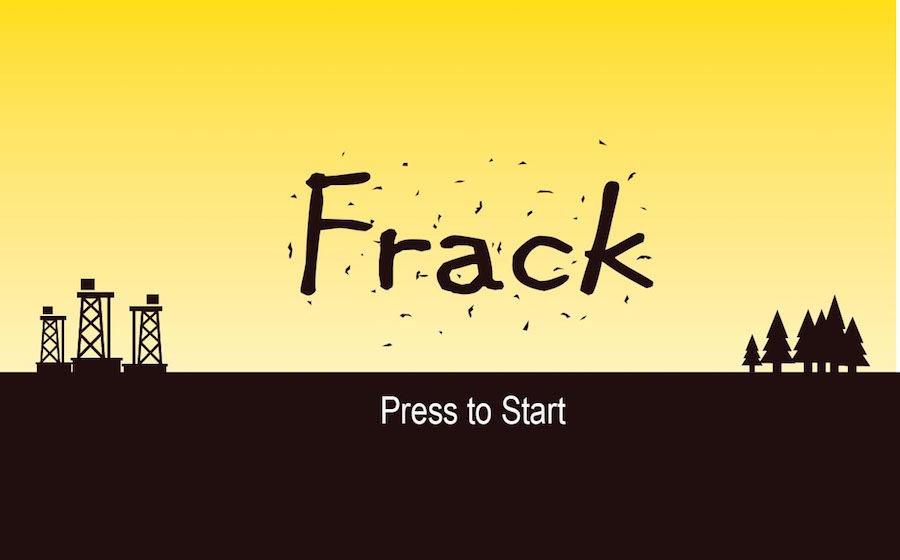
Standing at the intersection of cultural anthropology, English, computer science
The UC Davis ModLab, located in Cruess Hall, is a place where the humanities and STEM fields collide. The ModLab has multiple ongoing projects at any given time, ranging in topic from video game design to wearable technology.
Ranjodh Singh Dhaliwal, a Ph.D. student in the Department of English, is the project director for a game coming out of the ModLab called “Frack the Game,” which puts the player in the shoes of a fracking corporation.
Fracking is the process of pumping liquids (water, sand and chemicals) at high pressure into the ground. The high-pressure liquids create fissures in the shale rock layers deep underground, from which oil and gas can flow and be collected from. Fracking has a controversial history. While proponents say that the practice has driven down gas prices and will provide energy to the United States for years, opponents of the practice say that fracking releases radioactive chemicals, produces large amounts of toxic waste and is polluting people’s drinking water.
The concept for “Frack the Game” came from an undergraduate class at UC Davis that was taught by Dr. Joseph Dumit.
“One of the activities in the course was that students came up with this game,” Dhaliwal said. “You have to capture as much territory as you [can] to frack and to defeat your competitors by making the most money possible. The whole goal was to get into the mindset of a fracking company, where you might actually be aware of the environmental problems, but you still would choose to ignore them because of your immediate desire to win over your competitor and make more profit.”
After seeing the success of the game in the classroom, Dumit decided to make a video game with the same concept in collaboration with a team at ModLab. According to Dhaliwal, the game gives the player a more contextualized look at the thought process behind a CEO’s choices when it comes to making important environmental decisions.
“There was a very binary, very rudimentary understanding of what things at a corporate level entail,” Dhaliwal said. “Generally, the idea was that either [CEOs] don’t know about the harmful effects of the environment, or, if [they] know and [they] still continue doing it, [they’re] just plain evil. I don’t think that’s an unfair assessment, but I think it’s an inadequate assessment, as anyone playing the game would understand.”
The process of taking a complicated idea and translating it into a medium like a video game is a practice that is commonplace at ModLab, according to Dhaliwal.
“One of the things that we do at ModLab is critical game design or critical video game design,” Dhaliwal said. “The idea is […] to make video games open certain possibilities of experience and knowledge acquisition that just chatting or talking about them doesn’t.”
Like Dhaliwal, Katherine Buse is another Ph.D. student in English who works on projects at the ModLab. Buse also believes in the efficacy of video games in learning complex ideas, especially ones pertaining to science. This is because instead of observing a situation, like one would while reading a book or watching a documentary, the player is put inside of the situation, which allows for enhanced learning.
In addition to producing games that help players think about topics from other perspectives, ModLab also serves to bridge different parts of campus.
“We have people in performance studies; we have people in cultural studies; we have people in sociology, […] and we have people from computer science,” Buse said. “We’re pretty interdisciplinary.”
The field of English specifically has a long history with games and game design, according to Buse.
“The field of game studies and of critical game design […] was born to a large extent out of English departments,” Buse said. “[English departments] started looking at different kinds of texts besides literary texts […] People believed that one of the reasons you looked at literary texts was to study culture, and as new media come up, like television or film or now video games, and become incredibly important to culture, it seems silly to restrict yourself to only look at books.”
Kris Fallon, an assistant professor of Cinema and Digital Media, has been with the ModLab for two years. Fallon believes that the ModLab serves to bridge communities at UC Davis by erasing the pecking order.
“[One of the things that] Modlab does really well, and perhaps uniquely on campus, is that it [brings together] multiple people at different stages in their academic careers,” Fallon said. “There are undergrads, graduate students, faculty and postdocs all collaborating on these projects in this really interesting way […] It gives undergrads the chance to do some research, it gives faculty a chance to draw on their knowledge, and it breaks down the traditional hierarchy in good ways, or at least it tries to.”
One of the projects that Fallon has been working on at ModLab is the Critical Wearables Computing project, which uses wearables (like iWatches or Google Glasses) in its research.
“Wearable computing […] proposes to help us improve ourselves by getting us to take more steps or consume fewer calories or sit up straighter,” Fallon said. “If wearable computing wants to help us be our best selves, what is the type of self that we want to be, and what sort of assumptions are made when you say you can expose a self through technology? So we started thinking about different ways we could not just analyze how people were using the existing devices, but in a broader research context, what kinds of devices might be different than what was already out there.”
ModLab serves as a place where professors and students from both STEM fields and the humanities can collaborate using critical thinking and technology.
Written by: Meral Basit — science@theaggie.org



